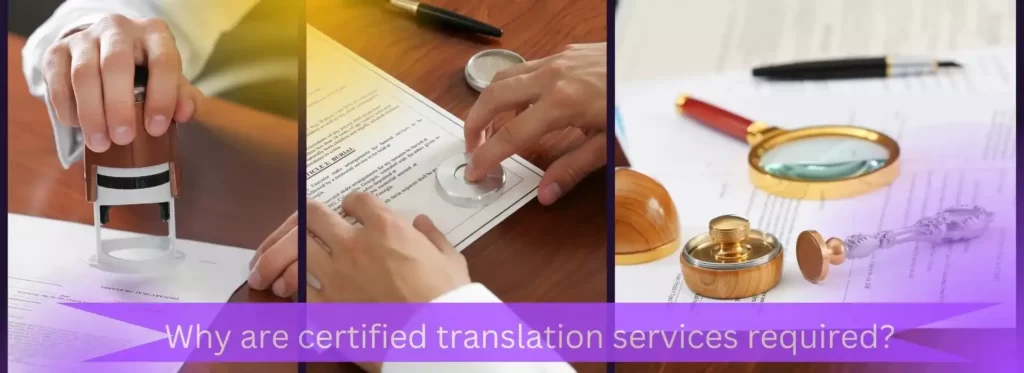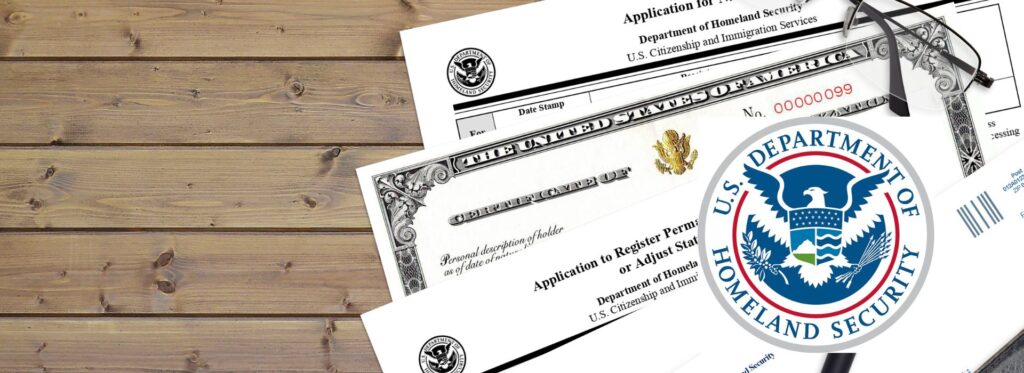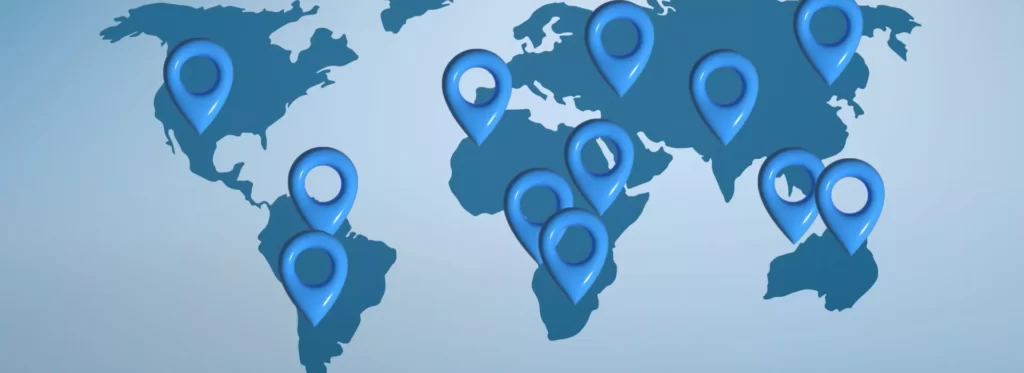To know why and when certified translations are needed, you must understand what distinguishes certified and uncertified translations. Following is more information about certified translation services.
Certified translations are typically needed for legal documents such as business contracts, court transcripts, immigration documents, adoption and birth documents, and death or marriage certificates.
A certified translation requires that the original document and the translated version be accompanied by a declaration signed by the translator, stating that the translation is complete and correct. Depending on the country and situation, you may need a notary to certify it.
A document may require a certified translation or a “Certificate of Accuracy.” The translation work goes through a rigorous process to ensure that the translation is correct and in the same format as the original before it can be certified. Generally, it is better to have your documents translated by a highly-rated translation agency.
When are certified translations usually required?
Generally, certified translations are demanded legal documents, such as documents used in hearings or trials, including any evidence or trial transcripts, in another language. As long as a document is to be presented to the government, translations must be certified.
Certified translations are also needed when applying for a temporary residence permit or emigrating to a foreign country. In this case, all documents that are written in another language must be translated into the official language of the country, and these translations must be certified.
Generally, either a certified or a notarized translation is required
A few years ago, the United States Citizenship and Immigration Services (USCIS) required that all certified translations be notarized. But now, that is not the case, and documents no longer need to be notarized. But the U.S. immigration office requires that all documents that are not written in English be translated and certified, with the exception of passports.
The USCIS requires that all documents be translated in their entirety. The translation should also match the appearance of the original document, including the location of stamps, seals, and signatures.
If the certified translated document is submitted directly to USCIS in the United States, it does not need to be notarized. However, if you are submitting your translation certificate to a U.S. consulate or embassy outside of the United States, all documents must be notarized.
If you want to apply to a foreign college or university, they often require that your transcripts, diplomas, and other documents relating to your studies in your home country be translated and certified.
And when are certified translations “not” required?
You do not need certified translations of personal documents sent for reasons other than legal proceedings. Documents such as family letters do not need to be certified by a translator. However, just because you don’t need a certified translation doesn’t mean you shouldn’t use a translator.
If you want the utmost accuracy when translating your documents to other languages, the wisest thing to do is to work with a certified translator who is an expert in the languages required and experienced in their field.
You should ask the company, institution, or person to whom you are sending the documents about their certification requirements. While legal documents must have certified translations, institutions, and companies have their own policies, so it is always a good idea to consult with them about their requirements.
Why should you hire professional and certified translation services?
1. Mistake-free work with utmost accuracy
You cannot use casual language in legal documents. Professionals know how to use legal terms and statements in the text correctly. A translation firm provides you with certified native translators who, along with having the collective knowledge of laws and legal precedents, also know how to find precise equivalents of words written in the original documents.
These professionals will make sure that your document is proper, in legal terms. The translation companies make sure that your documents are accurate and error-free.
2. The court accepts these documents
Because of the experts’ experience, courts are more likely to accept certified translations of legal documents. The court almost never disapproves of these documents, but if it does, the company will help you to get the document right, according to the court’s specifications.
Also, the companies have certified legal translators whose authentication of your document makes the attestation process quick and easy. Thus, it is better to have a professional legal document translation firm by your side.
3. You save time and money and avoid headaches.
Consulting with different people who claim to be experts in this field, finding good editors, and following up with them for corrections is a waste of your time, money, and efforts.
Instead, let Translingua handle your legal documents. It has the best translators and editors. In case you need some translated legal documents to be presented urgently, Translingua can handle it efficiently.
4. Get all kinds of translations in one place
There are many types of legal documents, from birth certificates to education documents, marriage certificates, and finally death certificates. Whenever you need any translated legal documents, no matter the type, your purpose will be fulfilled by your chosen translation company.
There shouldn’t be any barriers to the attestation of your legal documents. You can get them translated by Translingua, which employs a team of experienced native translators working all over the world!
FAQ
Translation services are designed to help companies that have products, services, or content that need to be translated into another language. Translation can be done in many different languages and will depend on what your needs are. For instance, you may want a website translated from English into German because there’s a large portion of your customer base in Germany.
Professional translators from Translingua have experienced professionals and are well-educated in their specific field. They use industry-standard tools and software to ensure they deliver accurate work every time you place an order, as well as update any glossaries or terminology databases if necessary. This way, you can have peace of mind that the quality is always high.
A translation project manager takes care of each step in your order from start to finish — taking orders, assigning translators and proofreaders, managing workflow, etc. The project manager will keep you informed about any issues that might arise and ensure your order is completed on time to the highest standard of quality possible.
Many companies think it’s too expensive or complicated to make their content available in other languages — but it doesn’t have to be. It’s actually much easier than they think and doesn’t require a huge investment. Translated content can help you reach new customers in other countries, which means higher sales.
The length of each order will vary depending on several factors: how many words you need to translate, how many languages you will be using, and whether you have an urgent deadline. We will let you know what we can do for you when you contact us.
A proofreader reads through the finished document in their native language and checks for any errors or inconsistencies that the translator may have missed. They will ensure your finished document is completely accurate before it goes back to you or the client.
Localization services help companies that need content translated into other languages, but also want to adapt their marketing material for specific countries and regions. These services may incorporate language, dialects, currencies, dates/times, measurements, addresses, and more.
English is the most commonly used language around the world, but that doesn’t mean it’s always necessary to translate your content into English! Some countries or regions speak other languages better than English; these include German (for Germany), Spanish (South America), French (France/Canada), and Chinese (China). Translingua can help you decide what languages would be best for your business.
You don’t need to share any information about yourself until your chosen translation company has given you a quote.
Hear others’ experiences with different U.S. Certified translation services
Ms. Olivia Francis,
who recently worked with a translation service agency says, “Finding a well-certified translation company is so essential. I had to translate my websites into a few languages to expand my business to other countries. So I looked it up online and finally found the best online translation service, Translingua translations. The translations were super accurate, and I was able to get a lot of customers worldwide. I would suggest anybody choose their translation company wisely and to know about them and their services fully before they proceed.”
Mr. Kevin Jeffords
Mr. Kevin Jeffords is a happy customer of Translingua. He says, “Back in 2019 I was really struggling to find a decent, affordable, and trusted professional language translation service to translate some of my official documents from English to Spanish. I was wondering where to get documents translated. I am glad it was a great experience working with Translingua. And I am glad I made the right decision.”
To summarize:
In conclusion, the difference between certified translation services and other translations is that the person who does a certified translation will have credentials. They may be an accredited translator or they might work for a company with certifications, such as those from American Translators Association (ATA). When you want to translate your website into another language, it’s best to hire someone who has experience in this area, because not everyone can do it well.



